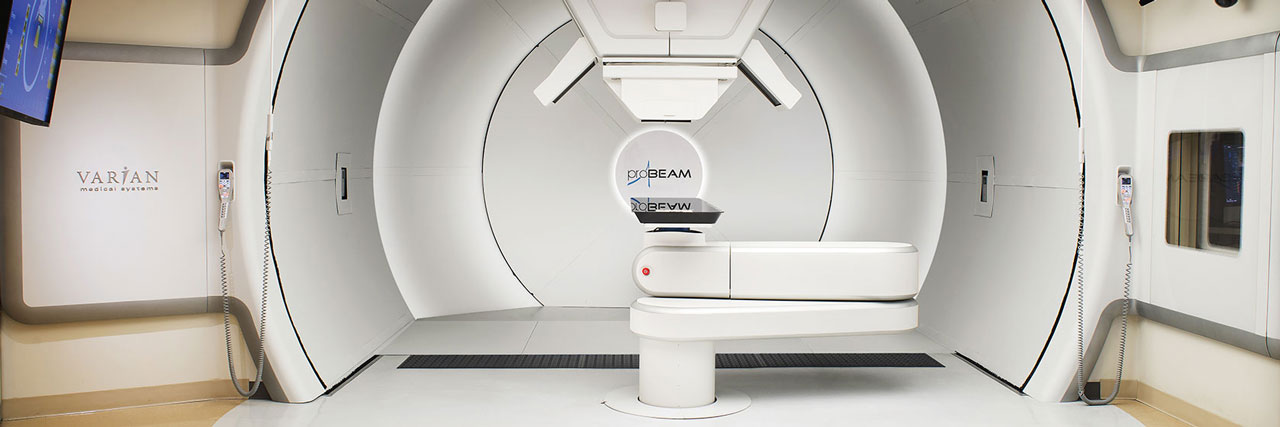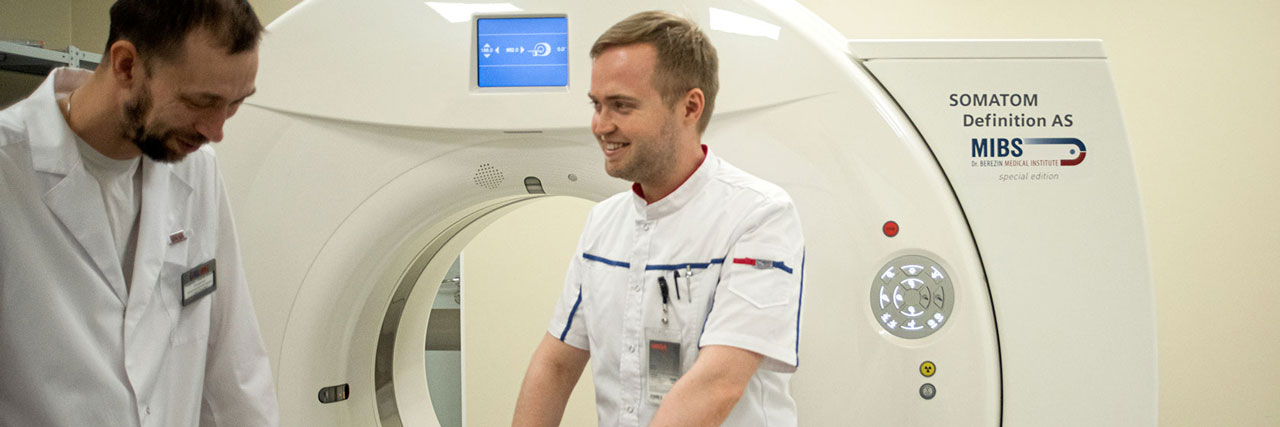en

Russia's First Proton Center
In the fall of 2017, the first clinical center for proton therapy in the Russian Federation and the CIS, built on the outskirts of St. Petersburg in the shortest possible time - in just 4 years - began operating. Its launch brought domestic radiotherapy to a qualitatively new level, opening up access to the most advanced radiation treatment available today for Russian cancer patients.
By destroying the DNA of malignant cells with the help of heavy charged particles, proton therapy differs from traditional photon therapy in significantly greater accuracy and much lower radiation exposure of healthy organs and tissues. The use of protons instead of X-rays not only significantly reduces the risks of side effects of treatment and the risks of secondary cancers, but also gives hope to patients with tumors which, due to their close proximity to the most important organs, were previously considered incurable (untreatable).
World class equipment
The sophisticated high-tech equipment installed in the Center - the ProBeam system from the world's leading manufacturer Varian - provides advanced technology for delivering proton therapy - "pencil beam scanning", allowing quick, precise and effective irradiation of tumors of the most complex configuration and location. The availability of two dosimetrically equivalent treatment rooms makes it possible to optimize the treatment process delivering more than 90 proton therapy sessions per workday.
To prepare computerized treatment plans, as well as to evaluate the results of therapy during and at the end of the course, the Center’s physicians use a modern high-field magnetic resonance imaging (MRI), multi-coil computed tomography (CT) and positron emission tomography (PET-CT) scanners from Siemens, a leader in radiation diagnostics equipment industry.

Comprehensive treatment
Patients arriving at the Proton Therapy Center can expect a comprehensive approach to solving their problem in accordance with modern treatment protocols used in the best oncology clinics in the world. A multidisciplinary team of doctors, including oncologists, radiotherapists, neurosurgeons, surgeons, chemotherapists, anesthesiologists, will develop an individual treatment plan that is best suited for your case.
Those who, in the doctors’ opinion, need chemoradiotherapy, will be able to combine proton irradiation with medication treatment, receiving it in the Department of Outpatient Oncology of the proton center or in the Department of General Oncology and Chemotherapy at the MIBS Oncology Clinic in Pesochny. If a patient requires surgery, it will be performed by highly professional MIBS surgeons in operating rooms equipped in accordance with the highest international standards. The fast track technique we have mastered, a multimodal strategy for managing surgical patients at all stages of treatment, helps to reduce the postoperative period and speed up recovery.
To help endure a long difficult treatment and improve the quality of life, during the entire period of stay in the Proton Therapy Center, the patient is attended by our doctors - therapists, psychologists, physiotherapists.
Our team
Even before the opening of the Proton Therapy Center, our radiologists and medical physicists had completed many months of training in the most acclaimed proton centers in the USA, Europe and Japan. Having accumulated their own invaluable experience, now, they rank among the best specialists in the world in the field of proton therapy.
The high professionalism of our staff has been recognized internationally. Head of the Department of Proton Therapy Nikolai Vorobyov, PhD, along with two other MIBS radiologists, became a member of the Education Committee of the ISRS (International Stereotactic Radiosurgery Society), the largest international organization uniting leading experts in the field of radiosurgery. Head of the Department of Medical Physics Georgy Andreev is a member of the steering committee of the Particle Therapy Co-Operative Group - an organization of scientists and specialists interested in proton, light-ion and heavy charged particle radiotherapy (PTCOG) and a full member of the World Gamma Knife User Society (LGKS).

Our patients
Since 2020, the Center has reached its full capacity, annually treating over 800 people who come to St. Petersburg from all regions of the country, as well as from near and far abroad. Over the years of the Center's operation, patients from Kuwait, Turkey, Canada, Great Britain, the USA, Israel and other countries have received proton therapy here. Providing, whenever possible, medical care to everyone who seeks help from us, we focus primarily on children for whom proton therapy, being the most effective and safe form of radiation, is recognized in the world as the most suitable method of radiation treatment. Almost half of our patients are under 18 years of age, and we plan to increase this ratio.
With the opening of our Center and thanks to the support of the regional government St. Petersburg became the first city in the world where all children eligible for proton therapy receive it at the expense of the state budget. On the whole, more than 95% of our patients receive high-tech treatment under regional and federal quotas or with the participation of charitable foundations.
MIBS is the largest health care provider
The Proton Therapy Center is part of the Sergey Berezin Medical Institute (MIBS). Being the largest Russian non-governmental medical organization, today MIBS includes almost 80 MRI centers throughout Russia and Armenia, a regional network of nuclear medicine centers (PET-CT), a video-EEG monitoring department, and the first private oncology clinic. Being engaged in the treatment of complex diseases for almost 20 years, we have taken a leading position in the Russian Federation in such areas as medical imaging, radiotherapy and proton therapy. Our staff totals more than 2,500 employees, of which more than 500 are doctors, including PhD and higher degree holders.